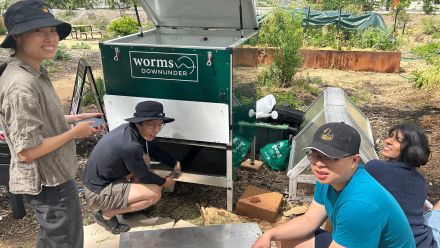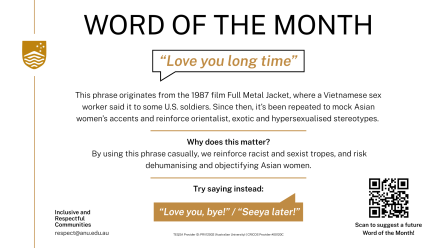Kate Western's research on identity after trauma
***This story mentions sexual assault which may be distressing to readers***
After the #MeToo movement in 2017, more women started coming forward to bravely disclose their own personal trauma and experience with sexual assault. We saw a shift in the language used in media, in society - the label 'survivor' taking preference over 'victim' to convey solidarity with women all over the world.
But what label should we be using? Do we have a right to push an identity on someone after theyhave experienced sexual violence ortrauma?
ANUPhD candidateKate Western, a person who has experienced sexual violence, is undertaking research exploring what happens to someone's identity when they experience sexual assault and howthis identity changes (or does not change).
Part of this research also investigatestheconsequences of pushing an identity on someone post trauma.
"Survivor language really took off with the #MeToo movement, and while I thought it was wonderful women were being supported andbelieved, I remember thinking at the time, this could also be a really horrible time to be a 'survivor'. What if you don't resonate with the term? It could be alienating. Everyone just by default became a survivor - this was their new identity."
Kate's motivation to start her PhD was to understand the impact this type of language may have on someone, and importantly how to support women who have experienced sexual assault.
"I felt like we are missing part of the picture.I was very supportive of the movement, but I felt there were some reductionist connotations with the term 'survivor' and that was quite confronting."
Noting it's a positive step in the right direction, Kate questions whether it's still a flawed response to an ultimately much more nuanced issue.
"The most important thing we can do is give people who have experienced sexual assault the power to choose their own identity. Choose how they frame that experience in their mind, how they relate to it and if they want to identity as a victim, as a survivor, neither or both."
While her research indicates that people who take on a survivor identity tend to have more positive mental health trajectories after a sexual assault incident,Kate stresses the importance that this isn't the case for everyone and while we know the term 'survivor' is generally linked to a better mental health outcome, people need to understand this is not a blanket rule.
"Enforcing labels on people who have by all respects already had their autonomy stripped awaycan have a detrimental effect."
Kate recognises that there still has to be an endorsement of the victim identity to some extent.
"It's very complicated. A lot of the time there is a dual narrative where women will have to take on both survivor and victim identities."
Referencing research in America, Kate shared the sad reality that reports of sexual assault are more likely to go to trial when someone presents as a 'victim' instead of a 'survivor'.
Kate's thesis will recognise the intersectionality of these identities and having respect for an individual's narrative.
"An experience of being a survivor is going to be very different depending on race, ethnicity, sexual orientation and gender identity. All these different valued identities that hold meaning for people are going to impact how you see yourself - whether you take on a victim or survivor identity. These terms are powerful and they do have such an impact on how we view others and how people view themselves."
"I would love to say by the end of my PhD that I've got media and reporting guidelines but the reality is it's going to be a lot more individual than that. You can't say everyone who has experienced sexual assault now has to conform to this identity.
We need to be nuanced in our approach and remember everyone's circumstances before or after they experience sexual assault will be different."
Post-traumatic growth correlation with post-traumatic stress
Another complex piece to Kate's research is the prevalence of post-traumatic growth (PTG). Post-traumatic growth refers to a positive psychological change that some individuals may experience after a traumatic event in their life.
Kate explains "those who experience post-traumaticgrowth don't return to baseline. They may change their meaning in life, their value system - they go above and beyond the resilient response."
Data is showing that those who experience extreme psychological distress are more likely to experience post-traumatic growth, while those who do not suffer from PTSD after a potentially traumatic event are less likely to experience a PTG response.
"We used to think that people either experienced post-traumatic stress disorder or post-traumatic growth. What we tend to see now is that people will experience both in tandem, to some extent."
Kate's advice on showing support
"If someone is trusting you with a very vulnerable story. Just listen. You don't need to tell them what to do, you don't need to have a million support options available off the top of your head. In your own way, let them know you are here for them - to hear them and listen to whatever their story is. Whether they know it was an assault, whether they aren't sure or whatever they are feeling, let themknow their response is OK and you are here to listen to them and you see them.
A lot of the time we worry about whether we responded appropriately or did we say the wrong thing. This is a normal reaction - it's not about if you said the wrong thing, the most important thing is that you are there in that moment with them and you are showing up for them. People will sense when they are being heard and your presence in the moment - this is much more important than whatever you do or don't say."
Kate is twoyears into her PhD and there are days her research does take an emotional toll, particularly with the reoccurring pattern how legal systems and the world have failed women predominately.
"But if Iwasn't having that reaction, I wouldn't be in the right area. Change won't be accomplished by my PhD alone but we do need people to do the work, we need people to continue to tell their stories, we need that to drive change."
For support services on campus:
For more stories and events celebrating International Women's Day at ANU this year, visit our IWD space.


